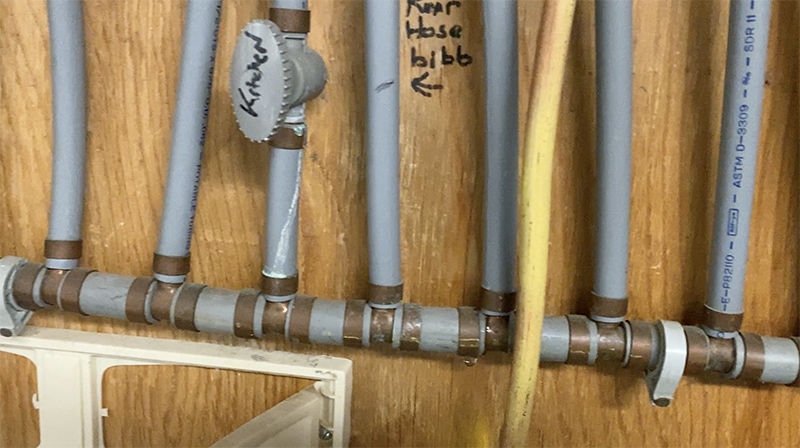
Got Problems with Your Gray Polybutylene Pipe?
Here’s what to do with polybutylene pipes in your home.
Chances are, if you’re reading this blog, you: a) know you have Gray Poly pipes in your property and b) know it’s an issue.
If you’re not sure what they are or what the issue is with them, then keep reading because we’re going to give you a quick introduction to the situation before showing you what needs to be done to avoid your home suffering extensive water damage.
The main takeaway? Don’t panic! There is a solution. But first, let’s take a look at the facts.
What is polybutylene pipe?
From 1978 to 1995, polybutylene was a popular form of plastic resin water supply piping used extensively in residential buildings.
Also known as PB pipe, Poly B pipe, poly pipe, gray poly pipe, and QUEST, it was incredibly low cost and easy to install, leading it to be the most popular substitute for traditional copper piping.
The Shell Oil Company was, from 1977 to 1996, the sole producer of polybutylene resin, which was the raw material for the piping. Incredibly flexible and generally chemical-resistant, polybutylene pipes don't corrode or calcify. As a result, it was often used in lower-priced homes and mobile homes.
It might have sounded great to the companies manufacturing and installing it, but homeowners are now stuck dealing with the fallout of subpar piping.

What’s the problem with poly pipe?
Over several years, a combination of oxidation and chlorine in the water supply causes polybutylene pipes to swell and crack.
Simply put, it's a matter of when, not if, your polybutylene piping will leak, potentially causing significant water damage to your home.
Back in the 90s, there were a lot of lawsuits against polybutylene pipe manufacturers, and Shell ended up paying out a $950-million settlement in 1995. The damage from polybutylene pipe leaks can be incredibly expensive, in some cases more than the original cost of the house.
Insurance companies know this – and will often refuse policies for homes with known poly piping issues. Some homeowners have even had insurance companies cancel their policies because of poly piping problems.
Want to sell your home? If it has Poly B pipes, they have to be completely replaced before you can sell. If placed on the market with PB pipes, buyers expect a heavy discount (even if the poly hasn’t leaked yet) because they know the piping will leak eventually, and they’ll have to replace it.
Although it isn’t against the law to not disclose poly piping, many property brokers have been sued for not disclosing the presence of polybutylene piping in buildings they sell.
If you want to sell your property, the best solution is to replace the piping now and avoid any problems in the future.
How do I know I have PB piping in my home?
There are a number of ways to identify poly piping on your property.
Polybutylene piping typically is:
- Used as the main water supply line (underground piping)
- Used to supply plumbing fixtures and water heaters
- Installed in basements, crawl spaces, and other unfinished areas
- ½ inch to 1 inch in diameter
If you think you have Poly B pipes, check for the manufacturer stamp “PB2110.” They’re usually gray or white but may also be blue, black, or silver.
The low down on replacing poly pipes
The only way to avoid potential water damage and issues with home insurance is to replace the piping. Replacement options for PB pipe include PEX, CPVC, or traditional copper pipes.
It’s best to get a repipe specialist to assess the current plumbing situation and scope out the extent of the replacement you’ll need.
Poly piping often runs behind the walls and under the floors of a home – which means that holes will need to be cut into your walls and floors during the repiping process.
When you hire a professional (like our poly pipe experts), they can complete the pipe replacement with minimal damage to walls and other structures.
If you have exterior poly piping, you might need a slight excavation with a trencher or boring under sidewalks and driveways to reach the piping.
How to avoid a poly pipe nightmare
Make sure you hire the right company. Replacing poly pipes shouldn’t destroy your home or pavements! There are a few warning signs to look out for when searching for a re-piping company:
- A super high price – replacing water supply piping in a typical home costs between $6,000 and $20,000, depending on the amount of piping used.
- Always get a second opinion on your project before hiring a company. Some of our clients have been given estimates from other companies that were 2x what their projects cost to complete.
- A super high price often indicates the work may be subcontracted out, or they used day labor to get the job done – this can result in poor results and lousy service.
- They can’t give any references – a good company has satisfied customers who are happy to recommend them for more work.
- Negative online reviews
- Inappropriate tools for the job – did they bring a sledgehammer or a drywall saw to the job? These aren’t needed and are completely overkill, which means your walls will be left in poor shape.
- Long timelines – poly pipe replacement might sound like a big job, but it’s really not. Our teams are usually in and out in less than a day. If someone’s giving you a week-long project timeline, they’re not familiar with the work.
Here’s what to do if you have poly pipe in your home
First of all, don’t panic! We help homeowners with their poly pipe problems every day of the week.
Next, give us a call at (703) 670-8519.
One of our talented plumbing technicians will visit your home to evaluate your situation fully. During this visit, we’ll:
- Verify you have a polybutylene piping system installed in your home
- Evaluate the complexity of removing the pipe and the amount of time needed. It includes assessing if we need to cut through drywall, the complexity of installing the new piping, how to protect your home from dust and debris, and the clean-up required. This determines the majority of the pricing.
- Prepare a material list that includes pipe, fittings, and other necessary materials.
- Finalize the cost of your project
How much does it cost to replace poly piping?
The cost to replace poly piping depends on the layout of your home.
The average cost to replace Poly B piping in a typical home is between $6,000 and $20,000.
Repiping a home isn’t a huge deal – there’s a lot less plumbing in your house than you think. It isn’t like electrical wiring, which is everywhere. We don't have to remove all the drywall or studs; we remove just what we need to replace the pipes. Repiping your home is probably easier than you think.
In most situations, we can be in and out in less than a day, as we repipe ourselves and don’t sub out.
If your home has challenging piping – like it’s hidden under an 8ft slab or it runs under your sidewalk or driveway – our expert team has the experience needed to find the most efficient, least invasive way to replace the piping.

